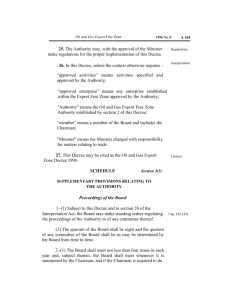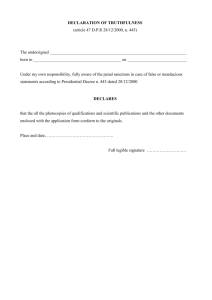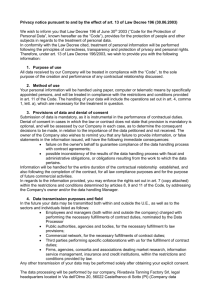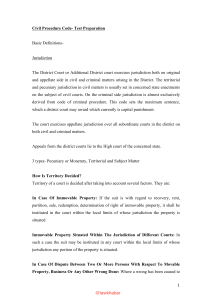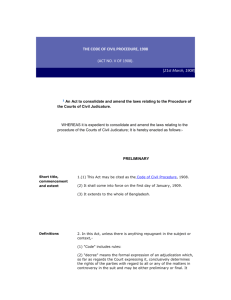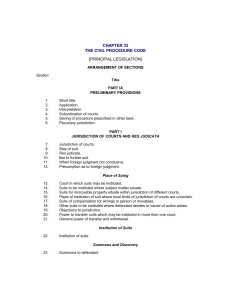exclusive jurisdiction
advertisement
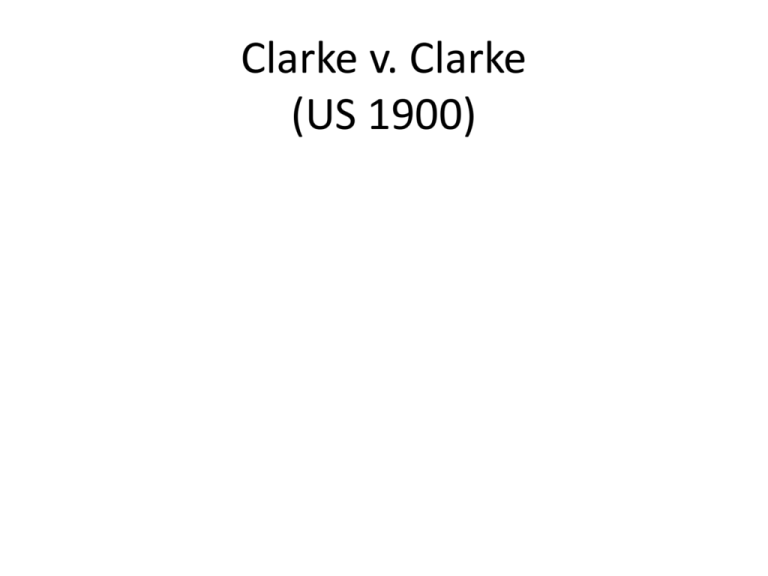
Clarke v. Clarke (US 1900) • “This is but to contend that what cannot be done directly can be accomplished by indirection, and that the fundamental principle which gives to a sovereignty an exclusive jurisdiction over the land within its borders is in legal effect dependent upon the nonexistence of a decree of a court of another sovereignty determining the status of such land. Manifestly, however, an authority cannot be said to be exclusive, or even to exist at all, where its exercise may be thus frustrated at any time.” Fall v Eastin (US 1909) • “Fall not having executed a deed, the court's conclusion was, to quote its language, that "neither the decree nor the commissioner's deed conferred any right or title upon her." This conclusion was deduced not only from the absence of power generally of the courts of one state over lands situate in another, but also from the laws of Nebraska providing for the disposition of real estate in divorce proceedings. In Cizek v Cizek it was held that portion of the decree which set off the homestead to the wife was absolutely void and subject to collateral attack, for the reason that no jurisdiction was given to the district court in a divorce proceeding to award the husband's real estate to the wife in fee as alimony.” • Holmes, J., concurring • “The real question concerns the effect of the Washington decree. As between the parties to it, that decree established in Washington a personal obligation of the husband to convey to his former wife. A personal obligation goes with the person. If the husband had made a contract, valid by the law of Washington, to do the same thing, I think there is no doubt that the contract would have been binding in Nebraska.” • But the Nebraska court carefully avoids saying that the decree would not be binding between the original parties had the husband been before the court. The ground on which it goes is that to allow the judgment to affect the conscience of purchasers would be giving it an effect in rem. It treats the case as standing on the same footing as that of an innocent purchaser. Now, if the court saw fit to deny the effect of a judgment upon privies in title, or if it considered the defendant an innocent purchaser, I do not see what we have to do with its decision, however wrong. I do not see why it is not within the power of the state to do away with equity or with the equitable doctrine as to purchasers with notice if it sees fit. Still less do I see how a mistake as to notice could give us jurisdiction. If the judgment binds the defendant, it is not by its own operation, even with the Constitution behind it, but by the obligation imposed by equity upon a purchaser with notice. The ground of decision below was that there was no such obligation. The decision, even if wrong, did not deny to the Washington decree its full effect. • Nancy B. Clarke, one of the parties to the suit in South Carolina, and whom the Connecticut court has held inherited, to the exclusion of the father, under the laws of Connecticut, the whole of the real estate belonging to her sister, was a minor. She was therefore incompetent, in the proceedings in South Carolina, to stand in judgment for the purpose of depriving herself of the rights which belonged to her under the law of Connecticut as to the real estate within that state… It cannot be doubted that the courts of a state where real estate is situated have the exclusive right to appoint a guardian of a nonresident minor, and vest in such guardian the exclusive control and management of land belonging to said minor, situated within the state. Baker v Gen Motors (US 1998) • Assume that in Michigan state court General Motors had brought a declaratory judgment action against the Bakers to determine whether Ewell could testify in any suit they might bring. What result? • African-American applicants to a fire dept sue the department • The court enters a decree for an affirmative action program in hiring • Subsequently white applicants to the fire department sue the department challenging the program • Are they precluded? Anglo-Am Provision v Davis (US 1903) • NY ct allowed to refuse suit on foreign judgment between 2 foreign corps when judgment arose from cause of action arising out of state Kenney v Supreme Lodge (US 1920) • Ill ct refused jurisdiction for suit on Alabama wrongful death judgment against an Illinoisan • basis was statute forbidding actions for death outside state • “Full faith and credit, however, does not mean that States must adopt the practices of other States regarding the time, manner, and mechanisms for enforcing judgments. Enforcement measures do not travel with the sister state judgment as preclusive effects do; such measures remain subject to the evenhanded control of forum law.” • “Orders commanding action or inaction have been denied enforcement in a sister State when they purported to accomplish an official act within the exclusive province of that other State or interfered with litigation over which the ordering State had no authority.”

